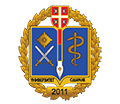25.12.2019
‘Truth dies harder than humans - Račak’ Round Table held
‘Truth dies harder than humans – Račak’ Round Table was held today at the Guard Club in Topčider barracks.
On behalf of minister of defence Aleksandar Vulin, the attendees were greeted by state secretary of at the Ministry of Defence, Aleksandar Živković, who opened the Round Table.
 - This is an opportunity to present the truth about the cause of aggression against a sovereign country through the presentations of distinguished speakers of the round table, which has led to numerous casualties, both for members of the defence and security system and citizens, including the youngest ones – children. This aggression has led to the great economic devastation of a sovereign country whose consequences we still feel today and to environmental genocide through the use of depleted uranium weapons, whose consequences we also feel. It is very important that those who will bear the greatest responsibility for the defence of the Republic of Serbia, the members of the Military and the Police, hear the discussions on this topic in the first place, state secretary Živković said.
- This is an opportunity to present the truth about the cause of aggression against a sovereign country through the presentations of distinguished speakers of the round table, which has led to numerous casualties, both for members of the defence and security system and citizens, including the youngest ones – children. This aggression has led to the great economic devastation of a sovereign country whose consequences we still feel today and to environmental genocide through the use of depleted uranium weapons, whose consequences we also feel. It is very important that those who will bear the greatest responsibility for the defence of the Republic of Serbia, the members of the Military and the Police, hear the discussions on this topic in the first place, state secretary Živković said.On behalf of the University of Defence, which organised the round table, Lieutenant General Goran Radovanović, rector of the University, welcomed the participants of the round table and emphasised that it was very important to discuss this topic, because it is an extremely important view of the truth. As he stated, “the truth is the most commonly misused term and this theory is applicable to the Račak case”. He also expressed the hope that everyone present would “draw a lesson” from today's speeches.
 A retired investigative judge of the District Court in Pristina, Ms Danica Marinković, who was a direct participant and witness of the Račak event, took part in the round table as well. She expressed satisfaction that she had the opportunity to speak to those present about the events.
A retired investigative judge of the District Court in Pristina, Ms Danica Marinković, who was a direct participant and witness of the Račak event, took part in the round table as well. She expressed satisfaction that she had the opportunity to speak to those present about the events.- There was no massacre, genocide or crime in Račak, as criminals and terrorists in Pristina still claim today. We have proven, with the evidence collected by the police, that Račak was a classic example of a conflict between Serbian police and Albanian terrorists - the investigative judge Marinković said, adding that thanks to her testimony and testimony of Professor Dobričanin, the ICTY prosecutor dropped the indictment.
- Working as an investigative judge, I witnessed terrorist actions in Kosovo and Metohija that were directed against the Serbian police and the Serbian army, against Serb civilians and Albanians loyal to the state of Serbia and state institutions at that time. As an investigative judge, I examined the village of Račak on 15th January 1999, where after three days I managed to enter the village, gather material evidence and prove that those who were killed in Račak were not innocent civilians. It was not the massacre of civilians, as Walker had falsely presented to the public, which was the reason for the aggression and bombing of the FRY, but we established, considering the weapons, bunkers, trenches and uniforms found, that they were members of the KLA terrorist gang and that this is a classic example of an anti-terrorist action, which the police have taken against terrorists, Marinković emphasised.
Retired police Colonel Bogoljub Janićević, who led the police in Uroševac during the anti-terrorist operation in Račak village, spoke about the security situation in Kosovo and Metohija at the time.
 - From July to September 1998, there were many terrorist attacks on the police, on the army, on civilians, there were many kidnappings. Those kidnappings and terrorist attacks have increased dramatically since the establishment of the verification mission - Janićević said, adding that those killings and kidnappings forced the security forces to plan extensive anti-terrorist action to arrest and prosecute terrorists responsible for these crimes.
- From July to September 1998, there were many terrorist attacks on the police, on the army, on civilians, there were many kidnappings. Those kidnappings and terrorist attacks have increased dramatically since the establishment of the verification mission - Janićević said, adding that those killings and kidnappings forced the security forces to plan extensive anti-terrorist action to arrest and prosecute terrorists responsible for these crimes.MPs Božidar Delić and Milovan Drecun also took part in the round table, discussing military and political circumstances on the eve of the NATO aggression and untrue media campaign about the event in Račak.
Among the panellists there were retired General Branko Krga, retired police General Obrad Stevanović, law professor Milan Škulic, and Colonels Marko Zelenović and Slobodan Đukić of the University of Defence.
The round table was attended by members of the Ministry of Defence and the Serbian Armed Forces, students of the General Staff and Command and Staff College of the School of National Defence, cadets of the Military Academy and students of the University of Criminal Investigation and Police Studies.

